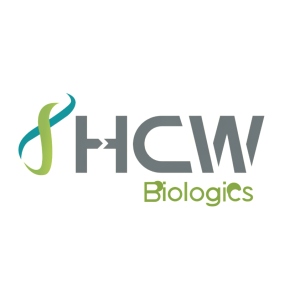HCW Biologics Reports Positive Results from Non-Human Primate Study for Its Proprietary Second-Generation T-Cell Engager Program
Rhea-AI Summary
HCW Biologics (NASDAQ: HCWB) has announced positive results from its non-human primate study for second-generation T-cell engagers (TCEs) targeting solid tumors. The company's lead drug candidate demonstrated strong safety profile and tolerance at doses significantly higher than efficacious levels.
The company's proprietary TRBC platform technology has developed TCEs targeting tissue factor and mesothelin, showing potent anti-pancreatic cancer activities in preclinical studies. Key advantages include reduced immunosuppression in tumor microenvironment, cost-effective manufacturing, and potential treatment for multiple solid tumors including pancreatic cancer and glioblastoma.
Notably, preclinical studies showed 100% survival rate in tumor-bearing mice treated with their TCE candidate. The company is now positioned to seek high-value corporate partnerships to advance development.
Positive
- Successful safety profile demonstrated in non-human primate study with no overt toxicity
- 100% survival rate in tumor-bearing mice versus 0% in untreated group
- Platform shows potential to treat multiple hard-to-treat solid tumors
- Cost-effective and streamlined manufacturing process developed
- Technology addresses key challenges of first-generation T-cell engagers
Negative
- Substantial capital required for further development
- Corporate partnership needed to advance development
- Still in preclinical stage with no human trial data
News Market Reaction – HCWB
On the day this news was published, HCWB declined 6.82%, reflecting a notable negative market reaction. Argus tracked a peak move of +17.0% during that session. Argus tracked a trough of -3.9% from its starting point during tracking. Our momentum scanner triggered 9 alerts that day, indicating moderate trading interest and price volatility. This price movement removed approximately $600K from the company's valuation, bringing the market cap to $8M at that time.
Data tracked by StockTitan Argus on the day of publication.
HCW Biologics conducted investigative study to show safe dose levels of its lead drug candidate in non-human primates that were well tolerated at a level significantly higher than the identified efficacious dose level
Program has addressed key challenges for first generation T-cell engagers related to manufacturability, preclinical safety profile, and ability to treat a wide spectrum of solid tumors
Program is positioned for a potential high value corporate partnership
MIRAMAR, Fla., Sept. 09, 2025 (GLOBE NEWSWIRE) -- HCW Biologics Inc. (the “Company” or “HCW Biologics”), (NASDAQ: HCWB), a U.S.-based clinical-stage biopharmaceutical company focused on discovering and developing novel immunotherapies to lengthen healthspan by disrupting the link between inflammation and age-related diseases, announced today that its scientists have successfully developed second-generation, tissue factor-targeting T-cell engagers against solid tumors, particularly for pancreatic cancer and glioblastoma, constructed with its novel proprietary TRBC product discovery and development platform technology.
T-cell engagers (“TCEs”) revolutionized the immunotherapeutic approach against cancer since the first indication was approved for Amgen’s BLINCYTO® (blinatumomab) in 2014. Currently, the U.S. Food and Drug Administration (“FDA”) and other regulatory agencies have approved eight TCEs to be used to treat 11 indications. Even with a very limited number of approved indications, approved TCEs are currently generating multi-billion-dollar annual sales. As the current FDA-approved T cell engagers reshape the landscape of cancer therapy, numerous high-value partnership deals between major pharmaceutical companies and biotech companies have been reported in the past two years. These partnerships have likely been driven by TCE’s potential in both oncology and autoimmune diseases and the majority of these deals were based on preclinical TCE programs.
Although there has been success in the development of TCE therapy, first generation TCEs continue to face a number of significant challenges such as antigen selection, efficacy for solid tumors, tolerability, safety, and complex manufacturing processes. HCW Biologics believes its second-generation TCEs could alleviate such shortfalls. The Company has constructed TCEs that have shown in preclinical studies to not only target cancer antigens and CD3 activation of effector T cells, but also simultaneously reduce immunosuppression in the tumor microenvironment. Reports have shown that such immunosuppression plays a pivotal role in reducing effector T-cell infiltration and anti-tumor efficacy in solid tumors. The Company’s two lead TCEs target tumor-expressed tissue factor and mesothelin, and its lead product candidates exhibit potent and antigen-specific anti-pancreatic cancer activities both in vitro and in humanized mouse models through subcutaneous injections.
In a recently completed non-human-primate safety study, the Company demonstrated that its subcutaneously administered anti-tissue factor T-cell engager was well tolerated at the efficacious or significantly higher dose levels and promoted the effector T cells. There was no evidence that it induced either overt toxicity despite the presence of tissue factor on various organs and tissues, or cytokine release syndrome, a common and serious side effect of TCE therapy. Tissue factor is an approved cancer therapeutic target as evidenced by the use of Pfizer’s TIVDAK® (tisotumab vedotin-tftv) for recurrent or metastatic cervical cancer. TIVDAK® is an antibody drug conjugate targeting tissue factor expressed on tumor cells. There is vast evidence showing that tissue factor is highly upregulated by a variety of aggressive solid tumors such as glioblastoma, pancreatic, breast, and ovarian cancer. Tissue factor upregulation is associated with tumor aggressiveness and resistance to chemotherapy, radiation, and immune checkpoint inhibitor therapies in the treatment of these solid tumors. With the ability to target tissue factor, the Company believes that its lead tissue factor targeting TCE has the potential to treat a wide spectrum of hard-to-treat solid tumors as monotherapy or in combination with standard-of-care therapies. Finally, a streamlined, simple, and cost-effective manufacturing process has also been developed for the Company’s second-generation, TRBC-based TCEs.
Dr. Hing C. Wong, the Company’s Founder and CEO, stated, “We are pleased to report that our proprietary TRBC platform was used to create second-generation T-cell engagers that we believe are effective, well-tolerated, and cost-effective that target difficult-to-treat solid tumors while managing tumor mediated immunosuppression. We have constructed a strong immunotherapeutic portfolio consisting of T-cell engagers with other antigen specificities using our proprietary TRBC technology.”
He continued, “Our preclinical studies show that our lead second-generation TCE could remarkably shrink the well-established tumors in mice models, and there was
Dr. Wong concluded, “Since the development of a TCE is complex and requires a substantial amount of capital, our strategy is to develop our lead product candidate in partnership with a financially strong corporate partner. I am very excited that we have achieved major milestones for evaluating this anti-tissue factor T-cell engager’s preclinical safety profile and its ability to target solid tumors while managing tumor mediated immunosuppression. These findings provide the necessary data to initiate discussions with major players who may be interested in building their T-cell engager portfolio with our lead TCE and other second-generation TCE product candidates in our portfolio.”
BLINCYTO® and TIVDAK® are registered trademarks of Amgen and Seagen Inc. (Pfizer Inc.), respectively, and these companies are not affiliated with HCWB.
About HCW Biologics:
HCW Biologics Inc. (NASDAQ: HCWB) is a clinical-stage biopharmaceutical company developing proprietary immunotherapies to treat diseases promoted by chronic inflammation, especially age-related and senescence-associated diseases. The Company’s immunotherapeutics represent a new class of drugs that it believes have the potential to fundamentally change the treatment of cancer and many other diseases and conditions that are promoted by chronic inflammation — and in doing so, improve patients’ quality of life and potentially extend longevity. Chronic inflammation, including inflammaging, is believed to be a significant contributing factor to senescence-associated diseases and conditions that diminish healthspan, including many types of cancer, autoimmune diseases, and neurodegenerative diseases, as well as many indications that impact quality-of-life that are not life-threatening. The Company’s lead product candidate, HCW9302, was developed using the Company’s legacy TOBI™ (Tissue factOr-Based fusIon) platform. The Company has created another drug discovery technology, the TRBC platform, which is not based on Tissue Factor. The TRBC platform has the capability to construct immunotherapeutics that not only activate and target immune responses but are also equipped with receptors that specifically target cancerous or infected cells. This platform is a versatile scaffold that enables the creation of multiple classes of immunotherapeutic compounds: Class I: Multi-Functional Immune Cell Stimulators; Class II: Second-Generation Immune Checkpoint Inhibitors; Class III: Multi-Specific Targeting Fusions and Enhanced Immune Cell Engagers. These novel immunotherapeutics are being developed for treatment of a wide range of disease indications, including oncology, autoimmune diseases, and improving quality of life conditions. The Company has constructed over 50 molecules using the TRBC platform. Further preclinical evaluation studies are currently being conducted for these molecules the Company has selected based on promising preclinical data. The Company has two licensing programs in which it has licensed exclusive rights for some of its proprietary molecules. See the Company Pipeline at https://hcwbiologics.com/pipeline/
Forward Looking Statements:
Statements in this press release contain “forward-looking statements” that are subject to substantial risks and uncertainties. These statements are made under the “safe harbor” provisions of the U.S. Private Securities Litigation Reform Act of 1995. Forward-looking statements contained in this press release may be identified by the use of words such as “anticipate,” “expect,” “believe,” “will,” “may,” “should,” “estimate,” “project,” “outlook,” “forecast” or other similar words and include, the actual success and potency of the Company’s TCE-based TRBC fusion molecules; the ability of the Company’s TCE’s to target cancer antigens, CD3 activation of effector T cells, and reduce immunosuppression in the tumor microenvironment; the ability of the Company’s TCEs to exhibit potent and antigen-specific anti-pancreatic cancer activities both in vitro and in humanized mouse models; or whether the Company’s TCEs are effective in treatment of solid tumors and pancreatic cancers. Further, certain forward-looking statements are based on assumptions as to future events that may not prove to be accurate. Factors that could cause actual results to differ include, but are not limited to, the risks and uncertainties that are described in the section titled “Risk Factors” in the annual report on Form 10-K filed with the United States Securities and Exchange Commission (the “SEC”) on March 28, 2025, the latest Form 10-Q filed with the SEC on August 18, 2025 and in other filings filed from time to time with the SEC.
Company Contact:
Dr. Peter Rhode
Chief Scientific Officer and Vice President of Clinical Operations
HCW Biologics Inc.
PeterRhode@HCWBiologics.com








